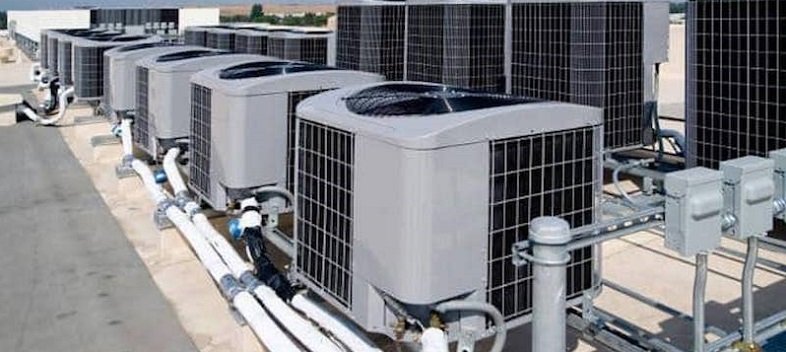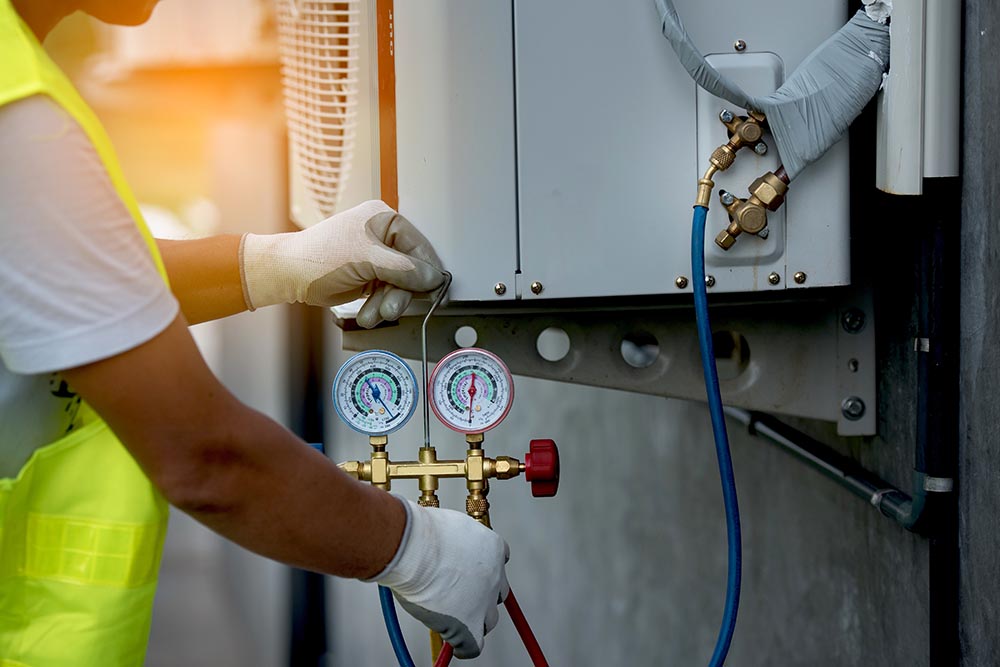The Top Benefits of Annual heat pump service
The Top Benefits of Annual heat pump service
Blog Article
Picking In Between a Warmth Pump and Furnace: Secret Considerations for Your HVAC Requirements
When reviewing heating alternatives for heating and cooling requires, the decision in between a warm pump and a furnace can be intricate. Each system offers unique advantages tailored to certain climates and energy effectiveness goals. Comprehending these distinctions is important for making an educated option. Trick elements such as installation costs and environmental effect even more complicate the option procedure. Which choice truly lines up with one's convenience and sustainability preferences? The complying with areas will explore these considerations in information.
Understanding Warm Pumps: Exactly How They Function and Their Benefits
While many house owners consider numerous heating choices, comprehending how warmth pumps feature and their advantages can greatly influence their decision. Heatpump operate by moving warm as opposed to producing it. In the winter months, they extract heat from the outside air or ground and transfer it indoors, while in the summer, they reverse this process, cooling down the home by eliminating warmth outside. This dual capability makes them functional for year-round environment control.One of the main benefits of warm pumps is their power efficiency. They use substantially much less electrical power compared to conventional heating unit, possibly causing lower energy costs (heat pump service). Additionally, warmth pumps have a smaller carbon impact, making them an eco-friendly choice. They likewise require less maintenance than conventional systems, adding to lasting price savings. Overall, recognizing the auto mechanics and benefits of warmth pumps can assist home owners make notified decisions regarding their home heating and cooling down demands
Exploring Furnaces: Types, Operation, and Advantages
Furnaces can be found in numerous kinds, consisting of gas, electric, and oil designs, each with unique functional devices. Understanding these distinctions is essential, as they impact effectiveness and heating performance. In addition, heaters provide various benefits, such as constant warmth result and reliability in cooler climates.
Kinds of Heating systems
Heating unit can vary substantially in design and procedure, with heaters being a prominent selection amongst property owners. There are numerous sorts of heaters, each utilizing various gas resources and innovations. Gas heating systems prevail, leveraging gas to create warmth successfully. Electric heating systems, on the other hand, use electrical resistance to generate heat, commonly favored for their straightforward installation. Oil furnaces, while much less usual, work in areas with restricted gas gain access to (furnace replacement). Furthermore, condensing heating systems take full advantage of power performance by recycling and capturing exhaust gases. Each type runs with a system of warm exchangers and ductwork to disperse warm air throughout a home. Understanding the differences between these furnace kinds is essential for educated HVAC choices
Advantages of Heating systems
For house owners looking for reliable warmth during chilly months, the benefits of heaters are significant. Heaters offer constant home heating, making sure also temperature levels throughout the home. They are specifically effective in severe chilly, commonly surpassing warmth pumps in frigid problems. Different types, including gas, electric, and oil heating systems, supply adaptability to fulfill varied demands and preferences.Furnaces likewise tend to have reduced preliminary installation expenses compared to heatpump, making them a much more obtainable alternative for numerous. Their durable design adds to a much longer life-span, with numerous systems lasting over 15 years with correct maintenance. Additionally, modern-day heaters are usually equipped with advanced innovation for boosted performance, which can bring about decreased energy expenses. Overall, furnaces stay a trustworthy selection for efficient home heating.

Energy Efficiency: Comparing Warm Pumps and Furnaces
When comparing energy efficiency between heatpump and heaters, the Seasonal Energy Effectiveness Ratio (SEER) plays a necessary role in figuring out performance. In addition, an operational price evaluation exposes the long-lasting financial implications of each system. Recognizing these variables can guide home owners in making informed choices regarding their home heating services.
Seasonal Power Efficiency Ratio
Energy efficiency plays a vital function in the decision-making procedure in between heatpump and heating systems, particularly when considering the Seasonal Power Efficiency Ratio (SEER) This statistics procedures the cooling performance of warm pumps over a whole cooling period, offering a standardized method to examine efficiency. Greater SEER rankings indicate better energy effectiveness, converting to reduced power usage and lowered utility bills. In comparison, heating systems are typically examined utilizing the Annual Gas Use Performance (AFUE) rating, which mirrors heating performance. When contrasting these two systems, house owners need to focus on SEER rankings for heatpump, as they directly impact total power savings and environmental sustainability. An extensive understanding of SEER can significantly influence the long-term complete satisfaction and cost-effectiveness of the chosen cooling and heating service.
Functional Price Analysis
Recognizing the operational expenses linked with warm pumps and heaters is essential for homeowners reviewing their options. Warm pumps generally provide greater energy effectiveness, transforming electrical energy into warmth with marginal waste. This leads to lower month-to-month utility costs, specifically in moderate climates. Alternatively, typical heaters, specifically gas models, might have reduced upfront prices however can sustain higher operational costs with time as a result of fuel prices and effectiveness ratings.Moreover, warm pumps can function as both home heating and cooling systems, possibly lowering the requirement for separate heating and cooling devices. While preliminary investments for heatpump might be greater, their lasting financial savings in power efficiency can make them an extra affordable selection for many homes. Mindful analysis of local power prices is vital to determine the ideal choice.
Installment Expenses: What to Expect for Each Furnace
Installment expenses for heater can differ considerably in between heatpump and heaters, influencing property owners' decisions. Warm pumps typically have higher upfront installment prices, generally varying from $3,500 to $8,000, depending upon the device size and intricacy of installation. This consists of the outdoor system, interior handling system, and needed ductwork modifications. Alternatively, heaters have a tendency to have lower preliminary costs, balancing between $2,500 and $6,000, which can be appealing for budget-conscious homeowners. Nevertheless, installation expenditures can enhance if comprehensive ductwork is required.Moreover, the selection of gas type for heaters-- all-natural gas, lp, or electric-- can the original source additionally influence installment expenses. While heat pumps use power performance, their initial investment might discourage some purchasers. Ultimately, examining installment costs alongside long-term savings and efficiency will certainly help homeowners in making informed choices concerning their heater.
Environment Factors To Consider: Which System Carries Out Much Better in Your Location
Exactly how do climate conditions affect the performance of furnace? The performance of heatpump and furnaces can vary significantly depending on the regional climate. In websites moderate environments, warmth pumps succeed by successfully moving heat from the outside air, making them an energy-saving choice. Nevertheless, their efficiency reduces in very chilly temperatures, where they may have a hard time to extract enough warm. Alternatively, furnaces, specifically gas designs, provide trustworthy and consistent heat despite outside problems, making them preferable in colder regions.In locations that experience milder winters, heatpump can operate efficiently year-round, supplying both cooling and heating. On the other hand, regions with rough winter seasons usually take advantage of the toughness of heaters. Ultimately, comprehending the neighborhood climate is vital when deciding between a warm pump and a heater, as it directly affects their functional effectiveness and total performance.
Upkeep Demands: Long-Term Treatment for Warm Pumps vs. Furnaces
While both heatpump and heaters call for regular maintenance to assure peak efficiency, their certain demands and care regimens differ considerably. Furnaces typically need much less regular attention, with annual assessments being adequate to look for gas leakages, clean filters, and evaluate total capability. Their simpler design often permits straightforward repairs.In comparison, heat pumps require semiannual upkeep due to their twin function in heating & cooling. This includes cleaning coils, checking cooling agent levels, and guaranteeing that both the interior and outdoor units work at their best. In addition, heatpump maintenance usually includes even more intricate parts, making professional servicing essential.Neglecting upkeep can cause diminished effectiveness and increased energy expenses for both systems. Inevitably, house owners should think about these lasting treatment needs when selecting in between a warm pump and a heating system, as positive upkeep can expand the lifespan and performance of either system significantly.
Ecological Influence: Picking a Sustainable Heating Option
The environmental effect of heater is a vital evaluation for homeowners seeking lasting alternatives. Heatpump are normally more energy-efficient than typical heating systems, as they move warm rather than create it, significantly minimizing carbon emissions. By using eco-friendly energy sources, such as geothermal or air-source heatpump, home owners can additionally minimize their ecological footprint.On the other hand, all-natural gas heating systems emit greenhouse gases and contribute to air contamination, though they frequently offer greater warm outcome. However, innovations in innovation have actually caused the growth of high-efficiency furnaces that decrease emissions.Ultimately, selecting a heating unit entails weighing efficiency versus environmental effect. Homeowners are motivated to assess local power sources and motivations for renewable systems, making certain a selection that straightens with both individual comfort and environmental duty. The choice influences not just instant comfort however likewise long-lasting sustainability and ecological wellness.
Frequently Asked Questions
How Lengthy Do Warm Pumps and Furnaces Usually Last?
The lifespan of warm pumps usually ranges from 15 to twenty years, while heating systems can last in between 15 to thirty years. Regular maintenance blog here considerably impacts their longevity and efficiency in supplying heating solutions.
Can I Use a Heat Pump in Incredibly Cold Climates?
Heat pumps can run in extremely chilly climates, but their performance reduces as temperature levels decrease. In such conditions, extra heating sources may be needed to maintain comfortable interior temperature levels and ensure peak efficiency.

What Is the Sound Level of Heat Pumps Versus Furnaces?
The sound degrees of heatpump and furnaces differ substantially. Generally, heatpump run even more silently than traditional furnaces, making them better for those conscious seem, while furnaces may create louder operational sounds during heating cycles.
Are Warmth Pumps Suitable for Both Cooling And Heating?
Heatpump are certainly appropriate for both heating & cooling (heat pump replacement ooltewah tn). They operate by transferring heat, providing efficient temperature level control year-round, making them a flexible choice for home owners looking for an all-in-one HVAC service
What Size Heating System Do I Need for My Home?
Figuring out the suitable size heating unit for a home calls for reviewing variables such as square video footage, insulation top quality, local climate, and the home's format. Consulting a specialist can ensure a precise analysis and optimal comfort. Heat pumps commonly offer higher power performance, converting electric power into warmth with very little waste. In modest environments, warm pumps stand out by efficiently transferring heat from the outside air, making them an energy-saving option. Alternatively, heating systems, particularly gas designs, offer reliable and consistent heat regardless of outside problems, making them more effective in colder regions.In locations that experience milder winters months, warm pumps can operate efficiently year-round, offering both home heating and air conditioning. Warm pumps are normally a lot more energy-efficient than conventional heating systems, as they move heat instead than create it, greatly minimizing carbon exhausts. By using sustainable power sources, such as geothermal or air-source warmth pumps, house owners can further decrease their environmental footprint.On the various other hand, natural gas heating systems give off greenhouse gases and add to air pollution, though they usually supply greater heat result.
Report this page